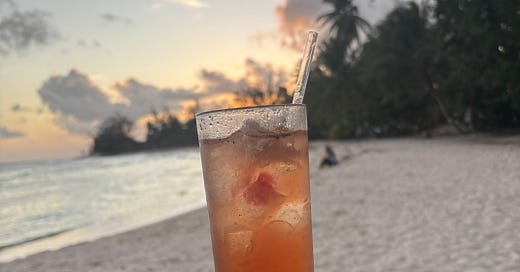Sue, Shrinkflation, and the Algorithmic Bartender:
A Night Out Between Technopoly and Togetherness
Technopoly by Neil Postman. Initially published in 1992 (this book is older than most TikTok influencers).
recommended it, and I gave it a quick read, or more accurately, a fast listen. And it hit.Postman’s diagnosis of a world that’s surrendered its culture to technology resonates more now than ever. Especially when you zoom in, not on AI or social media, but something as simple and human as… going to a bar.
The Bar as a System in a Technopoly
You go out in NYC. The beer is $11. The bartender doesn’t greet you, just gestures at the tablet. A card swipe. A glowing tip screen (20%, 25%, 30%). No eye contact. No hello. Just throughput.
What Postman saw in education and media, you now see in nightlife:
A ritual hollowed out by optimization.
A relationship replaced by a touchscreen.
A gathering turned into a transaction.
In Technopoly, Postman warns: when a society adopts technology not just as a tool but as a source of truth and value, human judgment gets outsourced. Meaning gets replaced with measurement. And suddenly, even a night out becomes a UX flow.
Even generosity is now a feature:
“Would you like to tip 25%... before you’ve even taken a sip?”
Barbados — A Tool-Using Culture of Hospitality
Now, cut to Barbados. Same idea—going out for drinks. Entirely different culture.
There, the bartender looks up and remembers your name. They bring over a bowl of chips, not because a POS system flagged your table as a low-spend risk, but because you look hungry. It’s an instinct. A gesture. Not a strategy.
The music plays, but it’s not programmed to control the crowd. The people set the tone. The DJ follows. Someone gets up to dance, and someone else joins in; suddenly, the room shifts. It’s organic. No one’s tracking engagement metrics.
Ah yes, we gonna have a party.
And here’s the thing: it’s not expensive to be there, at least at the bar. You’re not being squeezed for a 22% tip on a round of beers. You’re not being upsold every 10 minutes. A couple of drinks, a plate of fish cakes, maybe a round for a new friend—and you’re in. It’s affordable, human, and alive.
That’s what Postman might call a tool-using culture: technology assists, but it doesn’t replace the essence. The bartender isn’t hustling you. They’re part of the night, participating in a shared experience. They see you. You see them. And the space holds that mutual respect without an app, a KPI, or a transactional push.
Generosity flows more freely because people aren’t calculating every interaction. It’s not about how much they can get from you. It’s about what it means to be there together.
You can feel the difference in your body.
In New York or L.A., you're on edge. Calculating cost, time, and attention.
In Barbados, you're present or at least I am—I would imagine you might be too.
And then I realized, it's not only about geography. It's about how much friction you’re permitted to experience without facing punishment for it. Because sometimes, friction is what makes a connection genuine.
What Sue Taught Us About Defying the Countdown
Then there’s Sue. She is the owner of the bar and worked the party we attended. At 74 years old, she dances as if time doesn’t matter. The DJ announces the last song. She rolls her eyes and keeps moving.
“Yeah... I couldn’t let the party stop.”
That’s not just a mood. That’s a statement of resistance. Sue wasn’t ready to be optimized, ended, or gently pushed toward checkout. She was living, and algorithms or closing schedules can’t manage that kind of spirit.
Shrinkflation Isn’t Just a Product Problem—It’s a Culture Problem
Sure, NYC is expensive. But the more profound crisis is this:
Shrinkflation has hit culture itself.
We’re not just getting fewer chips in the bag; we’re getting less soul in our systems.
Going out used to mean spontaneity. Presence. Kindness that wasn’t preloaded into a POS interface. Now everything’s been turned into a measurable interaction:
Touch card.
Pick tip.
Scan the receipt.
Go home.
No story. No vibe. No moment.
What This Means for Marketers (and Anyone Designing Experiences)
If your business operates like a stuffy and impersonal New York bar, transactional, anonymous, and rigid, you’re in Technopoly mode. You’re designing for efficiency at the cost of intimacy.
Instead, build like Barbados:
Anticipate needs without requiring data surveillance.
Offer presence, not just service.
Design for generosity that isn’t linked to a loyalty tier.
The Bar Is a Mirror
Postman said that when we surrender culture to technology, we lose the ability to ask why.
Sue showed us what it looks like to say not yet.
Barbados offers a template for making room for ritual over ROI.
So here’s your challenge:
Bring out the chips before anyone asks.
Keep the music playing past the scheduled ending.
Be the bartender who remembers not just the order, but the person.
Because marketing, at its best, is cultural hospitality.
And culture can’t survive another round of shrinkage.





Love Neil Postman (read “Amusing Oursleves to Death” as well)!
I like the framing - the progressive reduction of everything to the minimum return for the transaction. Soulless, artless extraction.